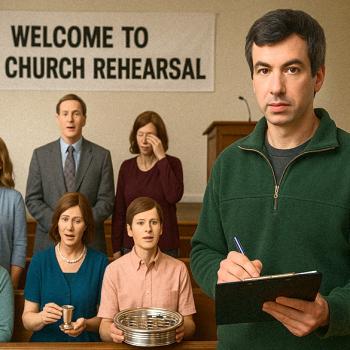But would she do it again? "We are still paying off my weddings," Jeanette laughs. "When you add together the dresses, the traveling, the receptions -- we could have bought a house. But I do think it was worth it. For me, marrying a Japanese man and deciding to live permanently in Japan has been both fantastic and challenging. When you are personally living the ‘cross cultural' lifestyle it is important that you respect the other's past and traditions. You can't just ignore it all in the name of love. Nor, I think, can you take on one of the other person's traditions at the expense of the other's."
That's not to say, you can't change. When David and Elise first started dating, the fact that he was Christian and she was Jewish was irrelevant. As they became more involved and starting talking about marriage, David realized that Elise's "Jewishness" was a fundamental part of how she saw herself and the world. "Elise never said to me 'convert or we're over'," explains David. "And if I hadn't decided to convert, I know that we would still be together. But it would have made her life much harder. My own religion meant nothing to me and I admired her commitment and the sense of family and tradition that the Jewish faith offers. While undertaking the conversion, I really started to appreciate the Jewish religion and I also believe it's important for kids to know where their parents stand on the issue."
Elise and David were married in a traditional Jewish ceremony and celebrated afterward with a traditional Jewish reception -- kosher food and all. Did he feel he was the one who'd made all the sacrifices? "Not one bit. My conversion wasn't a 'sacrifice' -- I feel as though my life has become so much richer because of it."
Religion and culture are inextricably entwined, and watching children marry out of their culture and into the unknown can be scary for parents. Bihn came to Australia in the late 1970s as a refugee from Vietnam and has four daughters, none of whom has married within the Vietnamese community. "Three of my daughter have married Aussies and one has married a Chinese," she says. The faith issue doesn't bother her, but the different cultural expectations do. "In traditional Vietnamese culture, you look after your children and then your children look after you. I worry that my daughters, now they have married outside our culture, will not take on this responsibility. Australian men are not used to respecting their elders and taking care of their parents."
There is no easy answer for those who choose to marry out of their culture or faith. Understanding that it may be difficult for parents and loved ones to accept and keeping the lines of communication open (if possible) is important. Learn as much as you can about the religion or culture you are entering. Not only will it help you understand where the parents are coming from, it will also help you understand your partner better.
Planning an inter-faith wedding? Consider these tips: Go for counseling. There's a lot you need to work out as a couple when you've come from such different backgrounds: how you feel about customs, religion, and how you want to raise your family. Working these differences out before you make things official will create less tension within your marriage, and will give you a good foundation from which to work when you decide how to plan your marriage. It also helps when you can present a united, thought-out front to both sets of parents.
Find the right celebrant. Not everyone is thrilled about joining two religions together. Find someone who really understands where you're coming from and has suggestions about marrying you that you can relate to, and which are inspiring.
Prepare, prepare, prepare. An inter-faith wedding can take more forethought than a regular one because there are no foregone conclusions about how everything will take place. Leave yourself enough time to really work this one through; don't have a short engagement if you can help it.
Don't leave out the other family. If you marry out of the religion in which you were raised, you are at least partially rejecting the values your family gave you. Don't make them feel even further rejected by having a wedding that doesn't recognize your roots at all. Try to incorporate rituals that are extremely meaningful to them, and that will also explain where you came from to your groom, his family, and your guests.
Keep the theme going. The interfaith wedding doesn't stop at the ceremony. It can continue through the dancing, choice of music, and menu options. Try and incorporate both aspects of each culture as cohesively as possible. Weddings are often about combining the traditional with the modern; so don't be afraid to mix things up.
*Some names have been changed.




